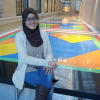
Being a Muslim Woman at MIT
Why I choose to wear a hijab and how it has affected my graduate school experience
On a sunny day last fall, I wanted to try cooking a typical Indonesian food called ‘rendang,’ a delicious spicy beef curry.

Figure 1. Rendang is best served with warm jasmine rice, shrimp crackers, and fresh cucumber.
I left my apartment to go grocery shopping while catching Pokemon at the same time. Then, suddenly, a person came out of his house and shouted “ISIS!” in my direction. I froze for a moment, trying to listen to his voice more carefully. Yes, he had just shouted “ISIS!” at me, and yes, I was scared. Without looking back and trying to ignore him, I kept walking. It was my seventh year at MIT, but this had never happened to me before. Not until the recent election.
The presidential election campaigns had a lot of speech targeting minorities. Even though the greater Boston area is a liberal place with a diverse community and a high proportion of immigrants, the thing I experienced was inevitable. After that moment, I have wondered countless times if my decision to stay here for graduate school and wear a headscarf was not the best.
My hijab/ headscarf is always the first thing that people see when they look at me. Some people do not see beyond that, and they do not know that I am Indonesian, that I am working on emerging solar cell technologies, or that I love cooking and handlettering. They misunderstand the reasons why women wear hijab.
Wearing hijab is not the sign of oppression; it is the sign of devotion, and I choose to wear it. Besides that, being visibly Muslim gives me a sense of community. Sometimes, when I go to a coffee shop nearby, the other Muslims will greet me, “Assalamualaikum” (Peace be upon you), or the waiter in a restaurant will tell me, “We have a halal[1] meat, so you may eat the beef kebab here.”
I have been wearing hijab for the past four years. At first, I was afraid that people would discriminate against me. That was not true, though. I still remember the day I came back to the US, wearing my headscarf for the first time. The air felt stifling in the immigration line. I held my passport, I-20, and MIT admission letter tightly. My headscarf felt so uncomfortable. I was contemplating whether I should go to the restroom to take it off, then put it back on after I passed through immigration.
I did not do that in the end. The immigration officer turned out to be a nice person, and he was so excited when he understood I was going to MIT, “Are you doing mechanical engineering at MIT? That is so awesome! Good luck on your sophomore year!”
People like that immigration officer encourage me to be more confident in what I believe. I should just care about my passion in renewable energy. I also love Boston so much. I love its bad weather sometimes — especially when we get unexpected snow days. I love its food options: from the North End to Chinatown, from Toscanini’s green tea ice cream, to Chinatown’s bubble tea. Because of this, I decided to stay at MIT for graduate school.
MIT is a very accommodating place during this difficult time. One day, after the new US President was elected, some students decided to put up posters in Lobby 7 so people could share their fears and hopes about the future of America. Reading people’s comments about how they would support their Muslim friends and other minority groups warmed my heart.

Figure 2. Share your hopes and fears

Figure 3. Written under “Share Your Fears”.
My roommate, an Iranian who also wears hijab, has had similar experiences and shares my frustration of going through this time. We spend nights talking about it in our kitchen while drinking tea. My friends and labmates would listen to my concerns and offer support. The MIT Chaplains also initiated a meeting with the Muslim community and provided support to people who had had the same experience as I had. And MIT Medical has offered mental health counseling. They also gave me tremendous support during my undergraduate years.
It is still difficult from time to time, especially when you got attacked personally in the street. Sometimes I still feel scared when I go to Boston or when people stare at my hijab. The new president was inaugurated, and a wave of protests have happened here and there. Things are changing under the new administration, but two things are still unchanged: my passion in renewable energy is still the same, and there are people who understand and support around me at MIT. Those are more than enough to keep me going.
[1] Halal meat: similar concept to kosher; the animals have to be slaughtered in a certain way.
Share this post:
